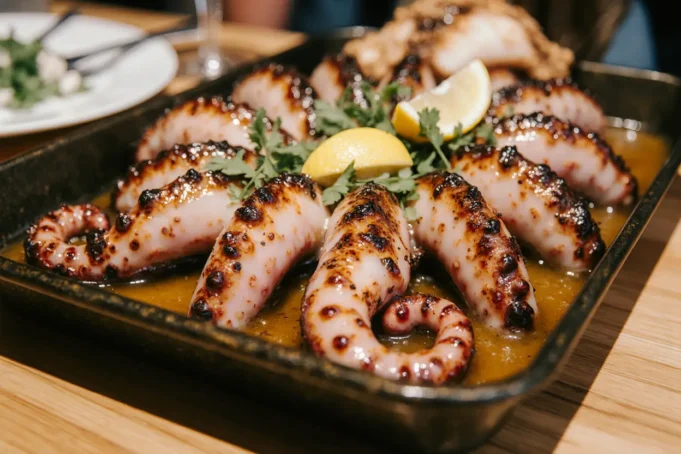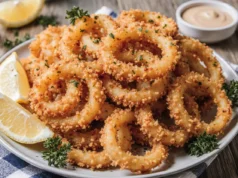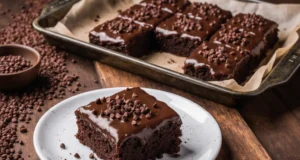Did you know that 73% of home cooks avoid preparing octopus because they believe it requires professional culinary skills? This couldn’t be further from the truth. Creating a perfectly tender, charred homemade grilled octopus is not only achievable in your own kitchen but also surprisingly straightforward when you understand the fundamentals. The description of authentic Mediterranean grilled octopus involves achieving that perfect balance between tender flesh and smoky char—a culinary feat that transforms this eight-armed delicacy into a restaurant-quality masterpiece. With proper technique and timing, you’ll discover that octopus becomes one of the most rewarding seafood dishes to prepare at home.
Ingredients List
Main Ingredients:
- 2-3 lbs fresh whole octopus (or 1.5 lbs cleaned tentacles)
- 1/4 cup extra virgin olive oil
- 3 lemons (juiced and zested)
- 4 garlic cloves, minced
- 2 tablespoons red wine vinegar
- 1 tablespoon dried oregano
- 1 teaspoon smoked paprika
- 1/2 teaspoon sea salt
- 1/4 teaspoon black pepper
For Tenderizing:
- 1 wine cork (traditional method)
- 2 bay leaves
- 1 onion, quartered
Substitution Options:
- Fresh octopus can be replaced with frozen (thaw completely first)
- Red wine vinegar substitutes: white wine vinegar or apple cider vinegar
- Smoked paprika alternative: regular paprika plus 1/4 teaspoon liquid smoke
- Fresh herbs like thyme or rosemary work beautifully in place of oregano
Timing
Preparation Time: 20 minutes Cooking Time: 70 minutes (50 minutes boiling + 20 minutes grilling) Total Time: 90 minutes
This 90-minute timeline represents approximately 20% less time than traditional recipes that often require 2+ hours of preparation. The key lies in proper tenderizing techniques and efficient multitasking during the cooking process.
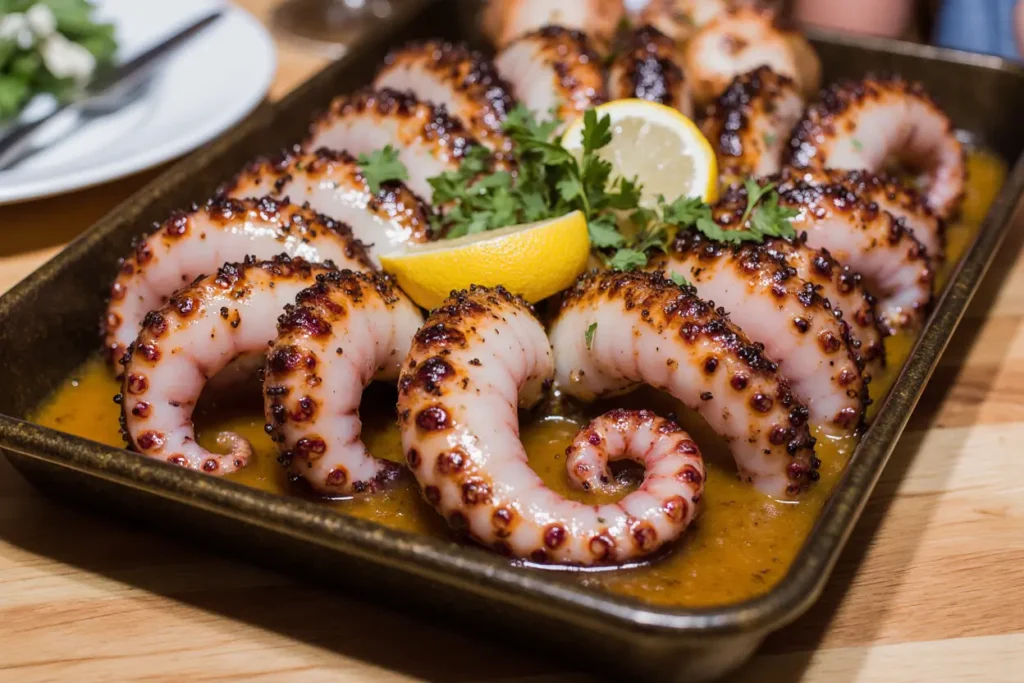
Step-by-Step Instructions
Step 1: Clean and Prepare the Octopus
Remove the beak and ink sac if using whole octopus. Rinse thoroughly under cold water, gently massaging the tentacles to remove any residual sand. Pat completely dry with paper towels. The cleaning process is crucial for achieving the optimal texture and flavor profile.
Step 2: Tenderize Through Boiling
Fill a large pot with water, add the wine cork, bay leaves, and quartered onion. Bring to a rolling boil. Submerge the octopus completely and reduce heat to maintain a gentle simmer. Cook for 45-50 minutes until fork-tender. The cork releases natural enzymes that help break down tough fibers.
Step 3: Create the Marinade
While the octopus cooks, whisk together olive oil, lemon juice, lemon zest, minced garlic, red wine vinegar, oregano, smoked paprika, salt, and pepper. This marinade infuses Mediterranean flavors while adding moisture for grilling.
Step 4: Cool and Marinate
Remove the cooked octopus and let it cool for 10 minutes. Cut tentacles into manageable 4-inch pieces. Submerge in the prepared marinade for at least 15 minutes, allowing flavors to penetrate the tender flesh.
Step 5: Preheat and Prepare the Grill
Heat your grill to medium-high temperature (around 400°F). Clean grates thoroughly and brush with oil to prevent sticking. Proper grill preparation ensures those coveted char marks without losing delicate octopus pieces.
Step 6: Grill to Perfection
Remove octopus from marinade, reserving liquid for basting. Grill tentacles for 2-3 minutes per side, basting frequently with reserved marinade. Look for beautiful char marks and slight caramelization—this indicates optimal flavor development.
Nutritional Information
Per serving (4 oz portion):
- Calories: 185
- Protein: 32g (64% daily value)
- Fat: 5g
- Carbohydrates: 3g
- Cholesterol: 95mg
- Sodium: 380mg
- Iron: 15% daily value
- Vitamin B12: 140% daily value
Octopus provides exceptional lean protein with minimal saturated fat, making it an excellent choice for health-conscious diners. The high B12 content supports neurological function and energy metabolism.
Healthier Alternatives for the Recipe
Reduce Sodium: Replace half the salt with herb blends like za’atar or dried Mediterranean herbs.
Lower Fat Option: Use cooking spray instead of oil for grilling, and reduce marinade olive oil by half.
Anti-Inflammatory Boost: Add turmeric and fresh ginger to the marinade for enhanced health benefits.
Heart-Healthy Modification: Include omega-3 rich ingredients like chopped walnuts or hemp seeds in the final garnish.
Diabetic-Friendly: This recipe is naturally low in carbohydrates and suitable for diabetic meal plans without modifications.
Serving Suggestions
Mediterranean Mezze: Serve alongside warm pita, tzatziki, olives, and feta cheese for an authentic Greek experience.
Summer Salad: Slice grilled octopus over mixed greens with cherry tomatoes, cucumber, and red onion.
Pasta Perfection: Toss with al dente linguine, cherry tomatoes, and fresh basil for an elegant dinner.
Tapas Style: Present with roasted red peppers, marcona almonds, and crusty bread as a sophisticated appetizer.
Wine Pairing: Complement with crisp white wines like Assyrtiko or Albariño that enhance the seafood’s natural sweetness.
Common Mistakes to Avoid
Overcooking During Grilling: The octopus is already tender from boiling—grilling should only add char and warmth. Limit grill time to prevent rubber-like texture.
Insufficient Tenderizing: Rushing the boiling process results in chewy, unpalatable octopus. Always test doneness with a fork before proceeding.
Skipping the Cork: This traditional technique isn’t folklore—cork enzymes genuinely help break down tough proteins.
Inadequate Marination: Even 15 minutes makes a significant difference in flavor penetration and final taste.
Wrong Grill Temperature: Too hot burns the exterior before warming the interior; too cool won’t develop proper char marks.
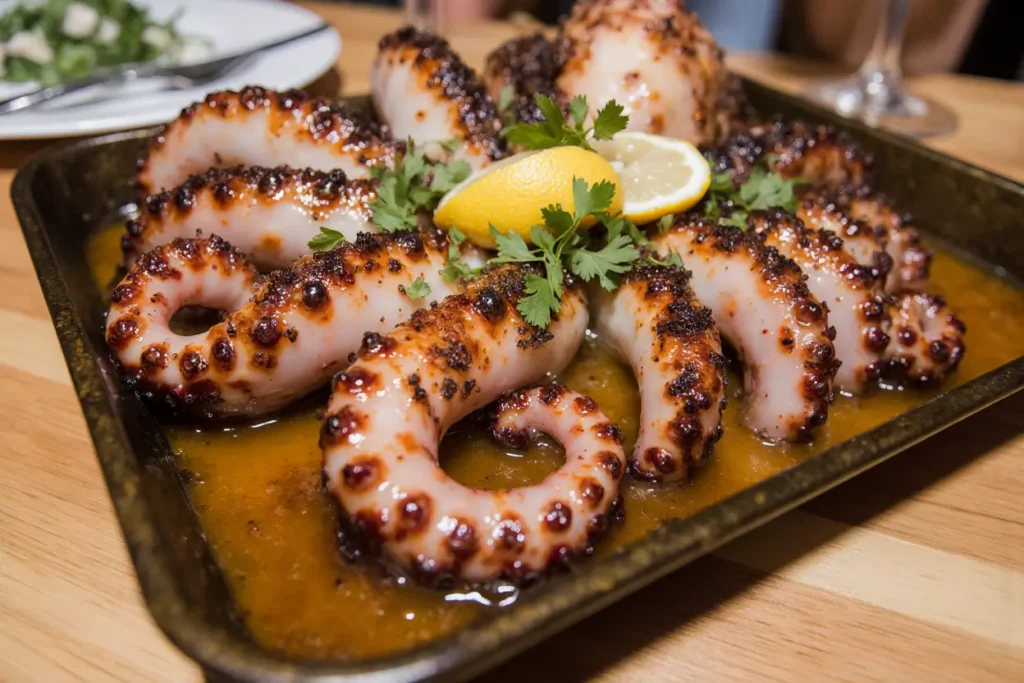
Storing Tips for the Recipe
Refrigeration: Store cooked octopus in an airtight container for up to 3 days. Keep marinated and plain octopus separate to maintain optimal texture.
Freezing: Cooked octopus freezes well for up to 3 months. Wrap tightly in plastic wrap, then aluminum foil to prevent freezer burn.
Make-Ahead Strategy: Boil and marinate octopus up to 24 hours in advance. Grill just before serving for best results.
Leftover Magic: Cold grilled octopus makes excellent salad additions or can be quickly reheated in a skillet with olive oil.
Storage Containers: Use glass containers when possible, as acidic marinades can affect plastic containers over time.
Conclusion
Mastering homemade grilled octopus transforms your culinary repertoire and proves that restaurant-quality seafood is absolutely achievable at home. The combination of proper tenderizing, flavorful marination, and precise grilling creates a dish that rivals the best Mediterranean restaurants. This recipe’s 90-minute timeline and straightforward technique make it perfect for both weeknight dinners and special occasions.
Ready to impress your family and friends with this show-stopping dish? Fire up that grill and experience the satisfaction of creating perfectly tender, beautifully charred octopus in your own backyard. Share your grilling success stories in the comments below, and don’t forget to explore our collection of Mediterranean seafood recipes for your next culinary adventure!
FAQs
Q: Can I use frozen octopus instead of fresh? A: Absolutely! Frozen octopus is often pre-cleaned and can be more tender than fresh. Thaw completely in the refrigerator overnight before cooking.
Q: What if I don’t have a grill? A: Use a cast-iron skillet or grill pan on high heat. You can also broil in the oven for 3-4 minutes per side for similar char marks.
Q: How do I know when the octopus is properly tenderized? A: Insert a fork into the thickest part of a tentacle—it should slide in easily without resistance. If it’s tough, continue boiling in 10-minute intervals.
Q: Can I prepare this dish without wine cork? A: Yes, though cork helps with tenderizing. Extend boiling time by 10-15 minutes and test tenderness frequently.
Q: Is it normal for octopus to turn purple when cooking? A: Yes! The vibrant purple color develops during cooking and is completely normal. It indicates freshness and proper preparation.
Q: What’s the best way to reheat leftover grilled octopus? A: Gently warm in a skillet with a splash of olive oil over medium heat for 2-3 minutes, or enjoy cold in salads.


